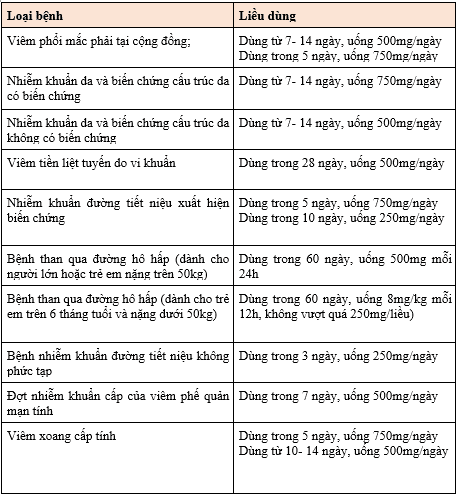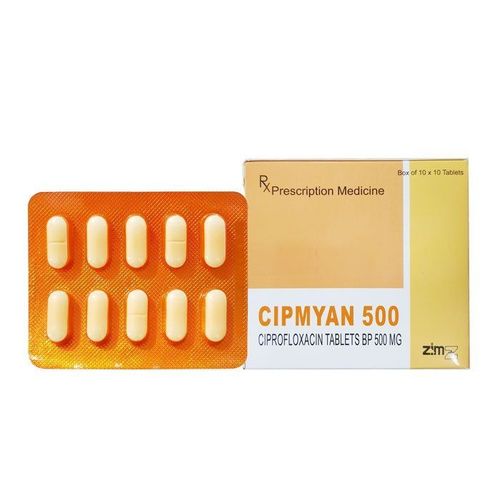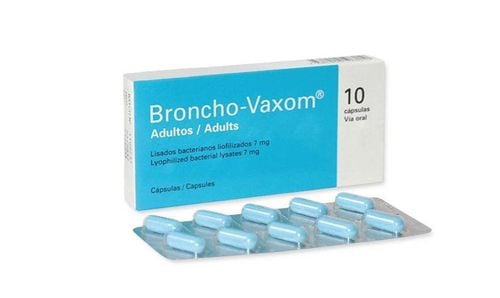This is an automatically translated article.
Maclevo 500 contains the main active ingredient, Levofloxacin 500mg, which belongs to the group of drugs to treat parasites and infections... So what are the specific uses of this drug, please refer to the article below.
1. Uses of the drug Maclevo 500
What is Maclevo 500? Maclevo 500 is prepared in the form of red-brown film-coated tablets and has the main active ingredient Levofloxacin hemihydrate which is equivalent to Levofloxacin 500mg and other excipients.
This is a prescription drug with indications for diseases such as:
Community-acquired pneumonia; Skin infections and skin structure complications with and without complications; Bacterial prostatitis; Urinary tract infections appear complications; Acute pyelonephritis; Respiratory anthrax; Applicable to uncomplicated urinary tract infections, acute bacterial sinusitis and acute bacterial infections of chronic bronchitis in the absence of any other alternative treatment options. Maclevo 500 is not allowed to be prescribed in the following cases:
Not for people with allergies or hypersensitivity to any active ingredients or excipients in the drug; Do not use the drug for the following diseases: epilepsy, liver disorders caused by the use of fluoroquinolones; Do not use for the following subjects: children under 6 months old, pregnant and lactating women.
2. Recommended dosage and how to use Maclevo 500

It should be noted that when using Maclevo 500 for people with kidney failure, it is advisable to consult a doctor for advice on adjusting the appropriate dose for each patient's condition.
The risk of acute poisoning with Levofloxacin is usually very low. However, in case of acute poisoning, it is necessary to empty the stomach, observe and maintain the patient's rehydration, should immediately go to the nearest medical facility for timely support.
3. Undesirable effects
Common: Monilia, nausea, headache, dizziness, gastrointestinal diseases such as: diarrhea, constipation, altered taste, sleep disturbance, increased phosphatase, rash, urticaria, vaginitis; Rare cases: Bacterial and parasitic infections, disorders such as: lymphatic system, immune system, metabolism, nervous system, mental, cardiovascular system, liver, skin, musculoskeletal, kidney , urinary system...
4. Drug interactions and incompatibilities
Concomitant use with antacids containing magnesium, aluminum, sucralfate, metal cations such as iron and multivitamin preparations containing zinc will interfere with the absorption of levofloxacin from the gastrointestinal tract, resulting in low drug concentrations. than; Levofloxacin had no significant effect on peak plasma concentrations and other parameters on warfarin-R and warfarin-S; There is an increased risk of CNS excitability and convulsions when NSAIDs are used with a fluoroquinolone including levofloxacin; When co-administered with Cyclosporin, Digoxin, and Levofloxacin, there was no significant effect on peak plasma concentrations, AUC and other parameters; Probenecid or Cimetidine did not significantly affect the Cmax of Levofloxacin; When co-administered with sucralfate, the bioavailability of Levofloxacin will be significantly affected. If the patient needs to take these two drugs concurrently, sucralfate should be administered 2 hours after Levofloxacin; Finally, the patient needs to store the medicine at a temperature below 30 degrees Celsius, it should be dry, cool, and avoid direct sunlight. In particular, pay attention to keep the medicine out of the reach of children and pets.
Please dial HOTLINE for more information or register for an appointment HERE. Download MyVinmec app to make appointments faster and to manage your bookings easily.













